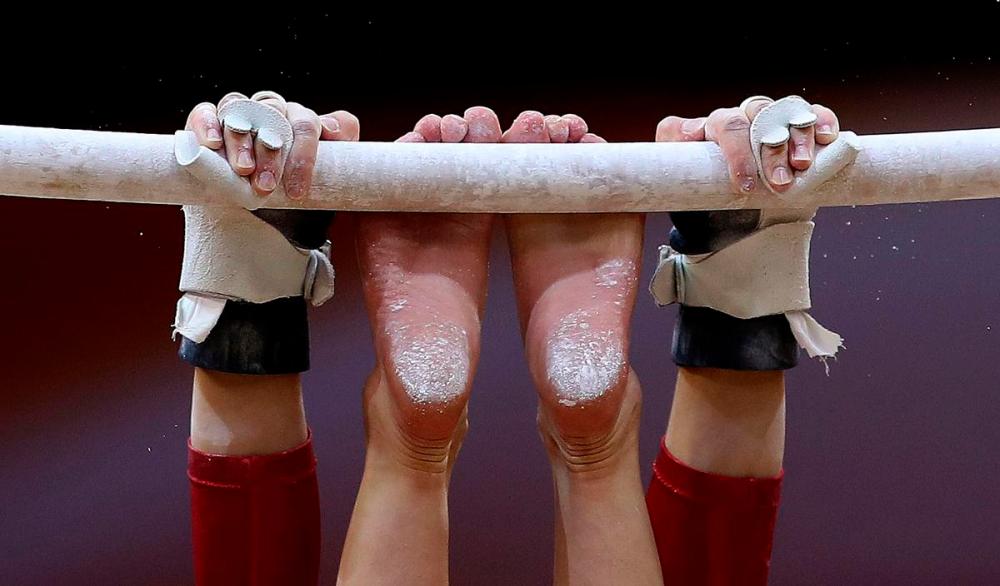Canadian gymnasts call for independent investigation into ‘abusive practices’
Advertisement
Read this article for free:
or
Already have an account? Log in here »
To continue reading, please subscribe:
Monthly Digital Subscription
$1 per week for 24 weeks*
- Enjoy unlimited reading on winnipegfreepress.com
- Read the E-Edition, our digital replica newspaper
- Access News Break, our award-winning app
- Play interactive puzzles
*Billed as $4 plus GST every four weeks. Offer only available to new and qualified returning subscribers. Cancel any time.
Read unlimited articles for free today:
or
Already have an account? Log in here »
Hey there, time traveller!
This article was published 28/03/2022 (1071 days ago), so information in it may no longer be current.
A second group of Canadian athletes — this time in gymnastics — are calling on the federal government to launch an independent investigation into “abusive practices” and systemic problems within their sport federation.
A letter made public Monday morning, signed by more than 70 current and former athletes, alleges “a toxic culture and abusive practices within Canadian gymnastics” that the “current board and CEO of GymCAN have failed to address.”
“We are coming forward with our experiences of abuse, neglect, and discrimination in hopes of forcing change,” states the letter addressed to Vicki Walker, director general of Sport Canada.

This follows a similar letter released three weeks ago by Canadian bobsled and skeleton racers. They say Bobsleigh Canada Skeleton has put some of them in harm’s way, has a toxic culture, silences dissent through fear of retribution, and may not be spending taxpayer funding efficiently.
In that case, Sport Minister Pascale St-Onge has ordered a financial audit of the federation. Her office says it will be thorough and “review compliance with all terms of the contribution agreement, including financial and governance.”
In the case of the gymnasts, St-Onge said: “I want to recognize the courage of the athletes who have come forward.” But her statement did not address whether she would order the investigation they’re looking for.
Rosie Cossar started gymnastics when she was five years old. By the time she was eight, she was travelling internationally to train and compete in rhythmic gymnastics. Her final competition for Canada came at age 21, at the 2012 London Olympics.
In the lead-up to those Games, she recalled a team practice in Russia that ran hours longer than normal, with athletes collapsing from exhaustion and wondering what they had done to deserve it. As the team leader at 18, Cossar spoke to the coach. She says that after being challenged, the coach left them — all of the others minors — to figure out how to get to their next competition in Ukraine on their own.
“This kind of psychological, emotional abuse was just daily,” Cossar says, adding the coach still works for the national federation. “The problems that I faced individually as an athlete are the same problems that generations before me have been facing and the generations after me … are still facing.”
Cossar, now a Toronto paramedic, says she and her partner have already decided never to put children in gymnastics, despite loving the sport.
“It’s an unsafe place for athletes, and we just we hate to say that. But we can’t put our own children through that.”
Kim Shore, who was an artistic gymnast for 16 years, has already had that experience the hard way.
“It’s analogous to the boiling of a frog,” she says. “As a sport parent, things are great and your child is loving the sport and then slowly little things start creeping in where you’re going: I don’t think that’s quite right. And pretty soon I was like: Oh my god, this really has not evolved since my time, like decades.”
Shore told her husband she thought she could fix it.
“I got involved with the club, then the province, then the Canadian federation, and then I realized: Oh my gosh, this is not isolated to the one bad coach I had or this one club my daughter is at. It’s the whole freaking system.”
Every athlete’s experience is unique, but she says the most common examples of the “abusive practices” the letter refers to include athletes being encouraged to train through serious injuries, forced overstretching leading to injuries, rough handling by coaches, pervasive yelling and body shaming.
“I realized I can’t work within the system and make change happen because there are just too many people protecting reputations, funding opportunities and jobs,” Shore says.
She resigned from the board of directors at GymCAN last summer: “I’ve never felt so powerless to make change as I did on the board of directors.”
In Canada, national sport organizations are independently run, but sign agreements to get federal funding that include requirements for policies that “prevent and address maltreatment in sport,” and a dispute process that allows an organization’s decisions to be appealed to the Sport Dispute Resolution Centre of Canada, according to Sport Canada. But athletes across many sports say the system doesn’t work or make them feel safe or supported.
Like the bobsled and skeleton athletes, the gymnasts behind the letter say the only way to create the meaningful change they’re looking for is through an independent investigation that publicly releases its findings and recommendations.
“We have pushed GymCAN to investigate issues internally and to change policies to ensure athlete safety,” the letter states. “We have gotten nowhere. Therefore, we now call on Sport Canada to fund an independent, third-party investigation into the ongoing toxic culture and abusive practices that persist within Canadian gymnastics.”
Kerry Gillespie is a Toronto-based sports reporter for the Star. Reach her via email: kgillespie@thestar.ca

